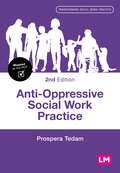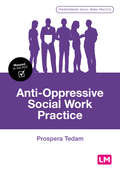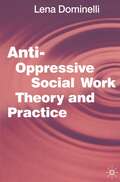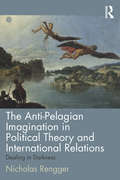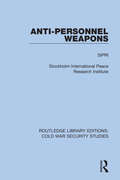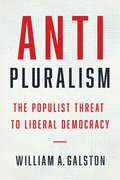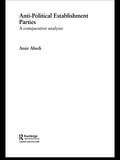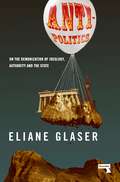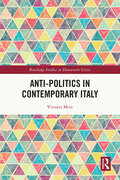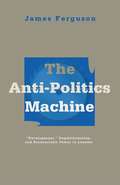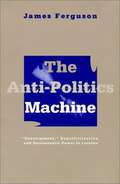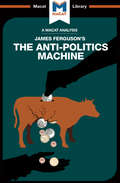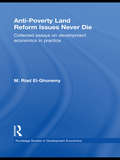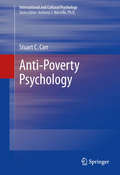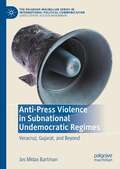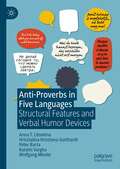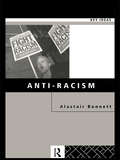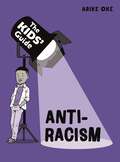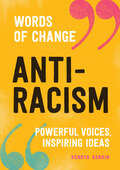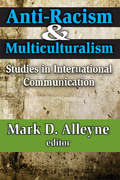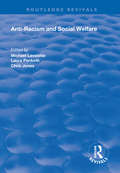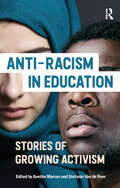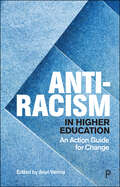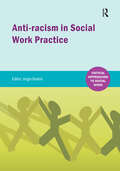- Table View
- List View
Anti-Oppressive Social Work Practice (Transforming Social Work Practice Series)
by Prospera TedamGrounded in principles and values of fairness and equality, anti-oppressive practice (AOP) lies at the heart of social work and social work education. This book will equip you with the tools and knowledge you need to address the concepts of diversity, oppression, power and powerless, and practice in ethically appropriate ways for contemporary social work practice.
Anti-Oppressive Social Work Practice (Transforming Social Work Practice Series)
by Prospera TedamGrounded in principles and values of fairness and equality, anti-oppressive practice (AOP) lies at the heart of social work and social work education. This book will equip you with the tools and knowledge to address the concepts of diversity, oppression, power and powerless, and practice in ethically appropriate ways for contemporary social work practice.
Anti-Oppressive Social Work Practice (Transforming Social Work Practice Series)
by Prospera TedamGrounded in principles and values of fairness and equality, anti-oppressive practice (AOP) lies at the heart of social work and social work education. This book will equip you with the tools and knowledge to address the concepts of diversity, oppression, power and powerless, and practice in ethically appropriate ways for contemporary social work practice.
Anti Oppressive Social Work Theory and Practice
by Lena DominelliThis book, by one of the leading theorists of social work, tackles a subject of crucial importance to students and practitioners alike: how social workers can enable their clients to challenge and transcend the manifold oppressions that disempower them (whether through poverty, disability, mental illness, etc. ). It moves from a discussion of social work's purpose and ambitions to an exposition of theory and, from there, to the practice arenas of working with individuals, in groups, within organisations, and within a wider social and political context.
The Anti-Pelagian Imagination in Political Theory and International Relations: Dealing in Darkness
by Nicholas RenggerThis volume draws together some of the key works of Nicholas Rengger, focusing on the theme of the 'anti-Pelagian imagination' in political theory and international relations. Rengger frames the collection with a detailed introduction that sketches out this 'imagination', its origins and character, and puts the chapters that follow into context with the work of other theorists, including Bull, Connolly, Gray, Strauss, Elshtain and Kant. The volume concludes with an epilogue contrasting two different ways of reading this sensibility and offering reasons for supposing one is preferable to the other. Updating and expanding on ideas from work over the course of the last sixteen years, this collection will be of great interest to students and scholars of international relations theory, political thought and political philosophy.
Anti-personnel Weapons (Routledge Library Editions: Cold War Security Studies #3)
by SipriThis book, first published in 1978, analyses the development, uses and effects of conventional anti-personnel weapons such as rifles and machine guns, grenades, bombs, shells and mines. It provides the historical, military, technical and clinical background to the international legal discussions as part of the ongoing efforts to prohibit or restrict the uses of some of the more inhumane and indiscriminate of these weapons, the most successful being the 1997 Ottawa Treaty that banned the use of anti-personnel mines.
Anti-Pluralism: The Populist Threat to Liberal Democracy (Politics and Culture)
by William A. GalstonThe Great Recession, institutional dysfunction, a growing divide between urban and rural prospects, and failed efforts to effectively address immigration have paved the way for a populist backlash that disrupts the postwar bargain between political elites and citizens. Whether today’s populism represents a corrective to unfair and obsolete policies or a threat to liberal democracy itself remains up for debate. Yet this much is clear: these challenges indict the triumphalism that accompanied liberal democratic consolidation after the collapse of the Soviet Union. To respond to today’s crisis, good leaders must strive for inclusive economic growth while addressing fraught social and cultural issues, including demographic anxiety, with frank attention. Although reforms may stem the populist tide, liberal democratic life will always leave some citizens unsatisfied. This is a permanent source of vulnerability, but liberal democracy will endure so long as citizens believe it is worth fighting for.
Anti-Political Establishment Parties: A Comparative Analysis (Extremism and Democracy)
by Amir AbediFirst Published in 2003. Routledge is an imprint of Taylor & Francis, an informa company.
Anti-Politics: On the Demonization of Ideology, Authority and the State
by Eliane GlaserAn analysis of the rise of populism and the disavowal of politics in the West in recent years.In recent years, the West has seen a rising tide of populist and anti-political feeling. Figures like Donald Trump and Nigel Farage have gained power by distancing themselves from “the establishment” and portraying politics itself as the enemy of the people. And it’s not just them — increasingly, the media and politicians of all stripes hurl the word “ideological” as an insult, tie themselves in knots to avoid mentioning “the working class,” and champion the “depoliticising of key decision-making.” In this book, Eliane Glaser — one of the early commentators to call attention to this new wave of populism — takes stock of how we got here and where we’re going. At the heart of this is a vital question: Is the “death of politics” simply an inevitable sign of the times, going hand in hand with climate change, technological development and postmodern malaise? Or is it the intentional result of right-wing engineering? In addressing this question, Glaser shows how forces on the Right have manipulated and benefitted from the apathy of anti-politics; and how the Left’s move to centre under neoliberal leaders has helped in the process. She argues that in order to revive productive engagement and hope for the future, we need to return to three pillars of political philosophy that have become dirty words: ideology, authority and the state. Glaser puts forward a strong and galvanising defence of these foundations, showing that however unpopular they may be, they’re necessary for the functioning of a fair society.
Anti-politics in Contemporary Italy (Routledge Studies in Democratic Crisis)
by Vittorio MeteThis book explores the discourses, attitudes, and behaviours of professional politicians and ordinary citizens alike characterized by hostility towards the political sphere, political parties, and above all, professional politicians. It furnishes a clear, consistent depiction of the antipolitics phenomenon in general using Italy as a ‘laboratory’ where anti-politics is widespread. After an original reconstruction of the concept of anti-politics, the author charts the rise of Silvio Berlusconi, the success of Umberto Bossi's Northern League, the resounding electoral victories of the 5-Star Movement and the League (La Lega), all rooted in the anti-political rhetoric of Italy’s leaders and the anti-political sentiment of its population. The author also traces the socio-political profile of the anti-political citizens of the main European democracies. This broad, consistent view of anti-politics will attract academics, journalists and policy makers interested in anti-politics in Italy and elsewhere. Students and scholars of party politics, party leaders, democracy and political participation will also find the volume of great interest.
Anti-Politics Machine: Development, Depoliticization, and Bureaucratic Power in Lesotho
by James FergusonDevelopment, it is generally assumed, is good and necessary, and in its name the West has intervened, implementing all manner of projects in the impoverished regions of the world. When these projects fail, as they do with astonishing regularity, they nonetheless produce a host of regular and unacknowledged effects, including the expansion of bureaucratic state power and the translation of the political realities of poverty and powerlessness into "technical" problems awaiting solution by "development" agencies and experts. It is the political intelligibility of these effects, along with the process that produces them, that this book seeks to illuminate through a detailed case study of the workings of the "development" industry in one country, Lesotho, and in one "development" project. Using an anthropological approach grounded in the work of Foucault, James Ferguson analyzes the institutional framework within which such projects are crafted and the nature of "development discourse," revealing how it is that, despite all the "expertise" that goes into formulating development projects, they nonetheless often demonstrate a startling ignorance of the historical and political realities of the locale they are intended to help. In a close examination of the attempted implementation of the Thaba-Tseka project in Lesotho, Ferguson shows how such a misguided approach plays out, how, in fact, the "development" apparatus in Lesotho acts as an "anti-politics machine," everywhere whisking political realities out of sight and all the while performing, almost unnoticed, its own pre-eminently political operation of strengthening the state presence in the local region.James Ferguson is an associate professor of anthropology at the University of California at Irvine.
The Anti-Politics Machine: Development, Depoliticization, And Bureaucratic Power In Lesotho
by James FergusonA case study of development in the Thaba-Tseka district of Lesotho during the period 1975 to 1984, which looks at the workings of the development industry in the country, and in particular at one development project.
The Anti-Politics Machine
by Julie JenkinsThe Anti-Politics Machine (1990) examines how international development projects are conceived, researched, and put into practice. It also looks at what these projects actually achieve. Ferguson criticizes the idea of externally-directed ‘development’ and argues that the process doesn’t take proper account of the daily realities of the communities it is intended to benefit. Instead, they often prioritize technical solutions for addressing poverty and ignoring its social and political dimensions, so the structures that these projects put in place often have unintended consequences. Ferguson suggests that until the process becomes more reflective, development projects will continue to fail.
Anti-Poverty Land Reform Issues Never Die: Collected essays on development economics in practice (Routledge Studies in Development Economics)
by M. Riad El-GhonemyWhat can we do to unlock the unrealised potential of the hundreds of millions of rural poor and landless workers? The ever-topical central theme in this collection of essays is the mixed role of government and the institutionally regulated market in tackling rural poverty and land distribution inequality. Drawing on over half a century of M. Riad El-Ghonemy’s academic and field experience in developing countries across Africa, Latin America, the Middle East and South East Asia, this is a comprehensive record of the late-twentieth century study of and struggle against rural inequality, seen through the eyes of one of its foremost observers. Containing a balance of in-depth field studies and El-Ghonemy’s personal observations from 1952 onwards, this volume provides the basis for discussion and debate on a range of developmental issues. Foremost among these is the appropriate approach both to explain the factors underlying developing countries' rural backwardness, and to enable them to achieve the Millennium Development Goal of halving the incidence of poverty and hunger by 2015. The compelling argument made here is that redistributive land reform, combined with non-farm intensive employment opportunities and investment in education within rural areas are necessary to tackle persistent poverty effectively. Anti-Poverty Land Reform Issues Never Die is essential reading for undergraduate and postgraduate students learning rural development and institutional and development economics. M.Riad El-Ghonemy is Senior Research Associate at the Department of International Development, University of Oxford and Research Fellow at the Department of Economics, the American University in Cairo, and Emeritus Professor, Ein-Shams University, Cairo. He is the author of several publications, including The Political Economy of Rural Poverty, Routledge (1990).
Anti-Poverty Psychology (International and Cultural Psychology)
by Stuart C. CarrPsychology has focused more on personalities in poverty -- pathologizing -- than on contexts for poverty reduction (Pick & Sirkin, 2010). As a result, the discipline has inadvertently sequestered and isolated itself, and its potential contribution, from poverty reduction initiatives - globally and locally. In recent years, there have been major developments in both the scope and depth of psychological research on global development issues. Some of the key developments include significant advances in understanding of what motivates teachers in schools, on designing community interventions to promote health, and on managing the development of human "capacity" in aid and development projects. The Psychology of Poverty Reduction is poised to capture such advances in the understanding of 'what works' - and what does not.
Anti-Press Violence in Subnational Undemocratic Regimes: Veracruz, Gujarat, and Beyond (The Palgrave Macmillan Series in International Political Communication)
by Jos Midas BartmanThe global trend of increasing violence against the press has spurred research interest into the questions of where, why, and how communicators are repressed. As a result, scholarship has demonstrating that hybrid regimes - which mix undemocratic and democratic elements - constitute a specifically dangerous and lethal context for these actors. Decentralized countries, in which some subnational political elites have retained authoritarian features, have been identified as the most perilous context for communicators. However, despite the burgeoning interest in illiberal practices and repression on the subnational level, it is still relatively unexplored how and why subnational political elites repress communicators within their multi-level setting. The author argues that communicators in subnational undemocratic regimes who can spread the scope of compromising information beyond subnational boundaries can cause uncertainties for subnational undemocratic regimes. The book explores how the political elites of these regimes repress these communicators in response.
Anti-Proverbs in Five Languages: Structural Features and Verbal Humor Devices
by Wolfgang Mieder Anna T. Litovkina Hrisztalina Hrisztova-Gotthardt Péter Barta Katalin VarghaThis book is the first comparative study of English, German, French, Russian and Hungarian anti-proverbs based on well-known proverbs. Proverbs are by no means fossilized texts but are adaptable to different times and changed values. While anti-proverbs can be considered as variants of older proverbs, they can also become new proverbs reflecting a more modern worldview. Anti-proverbs are therefore a lingo-cultural phenomenon that deserves the attention of cultural and literary historians, folklorists, linguists, and general readers interested in language and wordplay.
Anti-Racism (Critical Studies In Racism And Migration Ser.)
by Alastair BonnettThis introductory text provides students for the first time with an historical and international analysis of the development of anti-racism. Drawing on sources from around the world, the author explains the roots and describes the practice of anti-racism in Western and non-Western societies from Britain and the United States to Malaysia and Peru. Topics covered include:* the historical roots of anti-racism* race issues within organisations* the practice of anti-racism* the politics of backlash.This lively, concise book will be an indispensable resource for all students interested in issues of race, ethnicity and in contemporary society more generally.
Anti-Racism (The Kids' Guide)
by Arike OkeThis book will tell you more about what racism is and how to stop it happening. Maybe you are being bullied and you think it could be racial bullying. Perhaps you know someone who is being treated badly because of racism, and you want to help them. Perhaps you are worried that you might be behaving in a racist way and you want to know how to stop.Being anti-racist means being active against racism. This book gives some tips about how to be anti-racist in a positive and safe way. This book can help you spot racism and stop it in its tracks. If everyone bandstogether then we can make racism become ... extinct!Other titles in The Kids' Guide series:Anti-BullyingDealing with AnxietyDealing with DivorceDealing with DeathUnderstanding Autism
Anti-Racism: Powerful Voices, Inspiring Ideas (Words of Change)
by Kenrya RankinA celebration of resistance and stirring call for racial equity, this inspiring collection gathers the most enlightening writings of anti-racist activists like Ibram X. Kendi, Robin DiAngelo, and Ta-Nehisi Coates &“The day I stop fighting for equality and for people that look like you and me will be the day I'm in my grave.&” —Serena Williams Now more than ever, the fight for racial justice requires all of us to participate, not just during Black History Month, but every day of the year. This collection of stirring quotes from anti-racist activists is a call to action and a blast of truth. In these pages readers will find understanding and inspiration to end racial injustice. Journalist and activist Kenrya Rankin&’s powerful introduction explains how systemic racism poisons the atmosphere for everyone, while her selection of vibrant quotes illuminates and honors the work of anti-racist leaders past and present. Beautifully presented quotes and capsule biographies of the activists make this book a perfect gift or resource for students, educators, librarians, advocates, and allies who seek social justice and promote anti-racism. Voices include: Jason Reynolds, Ibram X. Kendi, Adrienne Maree Brown, Roxane Gay, Ta-Nehisi Coates, Alexandria Ocasio-Cortez, Amandla Stenberg, Elaine Welteroth, Franchesca Ramsey, Rosa Clemente, Robin DiAngelo, Darnell Moore, W.Kamau Bell, Lizzo, Opal Tometi, Audre Lorde, Malcolm X, Buffy Sainte-Marie, Frederick Douglass, Megan Rapinoe, Laverne Cox, and many more! Partial proceeds to benefit The Movement for Black Lives Fund.
Anti-racism and Multiculturalism: Studies in International Communication (Studies In International Communication Ser.)
by Mark D. AlleyneAll scholarly books are engagements with the existing literature, often the published scholarly work of one established discipline. This book originated with modest objectives, to produce a work that would be in conversation with the literature of international relations even though not of relevance only to that field. The professed goal of international relations is international peace. The ethical lens of pondering the best means to achieve world peace is used to filter media content in the field of multiculturalism and anti-racism. Although there has been little work on the impact of racial difference on the contours of contemporary international order, there has been a sizeable body of research intended to abolish the credibility of pseudo-scientific racism. Such racism has provided the ideological foundation and justification for imperialism, colonialism, the holocaust, and apartheid. Race has been debunked as a myth. Because of this, racism - the ideology bred of human classification according to racial difference - has been found to be intellectually and morally barren. But the need to communicate egalitarian and scientific sentiments remains. The contributors to this volume consider five questions: How does the literature on antiracism improve our understanding of conflict resolution? How does the analysis of the media's role in racist and anti-racist discourses improve the process of theorizing on hate and war propaganda? How can research on anti-racist discourse improve UN peacekeeping? What implications does this subject have for theory-building and cultural diversity? How and why should the literature on anti-racism expand research in international relations? This is a unique, worthwhile framework for cross-disciplinary research in race and intellectual consensus and conflict.
Anti-racism and Social Welfare (Routledge Revivals)
by Michael Lavalette Laura Penketh Chris JonesFirst published in 1998 , this book is a compendium of writings in regards to racism in 1990s Britain and the social impact racism have on black communities in Britain in regards to unemployment , working conditions , housing and health. Aiming to create a mode to provide a platform for a discourse on British black experience; by assessing the success and failures of various ant-racist strategies within welfare institutions and services designed to assist.
Anti-racism in Education: Stories of Growing Activism
by Geetha Marcus Stefanie Van de PeerA powerful book comprising stories of anti-racist action by higher education scholars including researchers and teachers at various stages of their careers. Aimed at and relevant for anyone in education, it encourages reflection on the tolerance of racist structures and strategies to help enact positive change.An edited volume, each chapter discusses the author's experiences of racism, including how they became part of anti-racist teaching activism through a growing understanding of the impact of racism in education. Common themes are highlighted throughout so readers can engage with relevant ideas and issues to draw inspiration for their own anti-racist action.The book draws attention to the idea that while discussion is welcome, it should be a pre-cursor to focused action. It shows exactly how university lecturers, teachers and anyone involved in education can contribute in a meaningful way to the change that is needed. To promote critical thinking, each chapter includes challenging questions and suggested additional readings/resources.
Anti-Racism in Higher Education: An Action Guide for Change
by Arun VermaHow is your institution enabling Black, Asian and minority ethnic staff and students to thrive? Is your institution effectively tackling racism? Following the 2020 Black Lives Matter movement, the higher education sector has started making bold commitments to dismantling structural racism. However, big questions remain about how higher education can combat institutional racism and achieve real change. This book disrupts the higher education sector through ambitious actions and collective, participatory and evidence-informed responses to racism. It offers a roadmap for senior leaders, staff and students to build strategies, programmes and interventions that effectively tackle racism. Arising from current staff and recent student experiences, this book supports institutions driving equality, diversity, inclusion and intersectional programmes in higher education.
Anti-racism in Social Work practice (Critical Approaches to Social Work)
by Angie BartoliAnti-racism has a long history within the profession of social work and its education. Despite an agenda within higher education which promotes internationalization and practice which recognizes diversity, little has been written to address the question of why black African students have a different experience from others on their social work educational journey.This book is based upon the authors’ experience as educators and their own research about and with black students’ experience of racism and ‘otherness’ within social work practice and education. Radical and honest in nature, it re-visits anti-racism within social work practice and education from a student focused and informed perspective based on lived experience and conversations.This book will be of interest to all social work students, educators and policy makers with an interest in anti-racism and diversity. It includes practical models and tried and tested tools to help the reader work through these issues. Tools that can assist students in discussing uncomfortable issues in the classroom are to be welcomed, and this book is thus a valuable resource. This book offers many examples of how racism can be addressed in social work education and training. Important features of the book are the summaries of key pieces of research in each chapter, as well as, case studies and critical questions, which provide a springboard for discussion. It offers a timely reminder that discussion about race and anti-racist forms of pedagogical approaches for teaching has fallen off the agenda. It is written in an accessible style, is an engaging read, and this is a welcome addition to the literature.Dr Claudia Bernard, Goldsmiths College.
